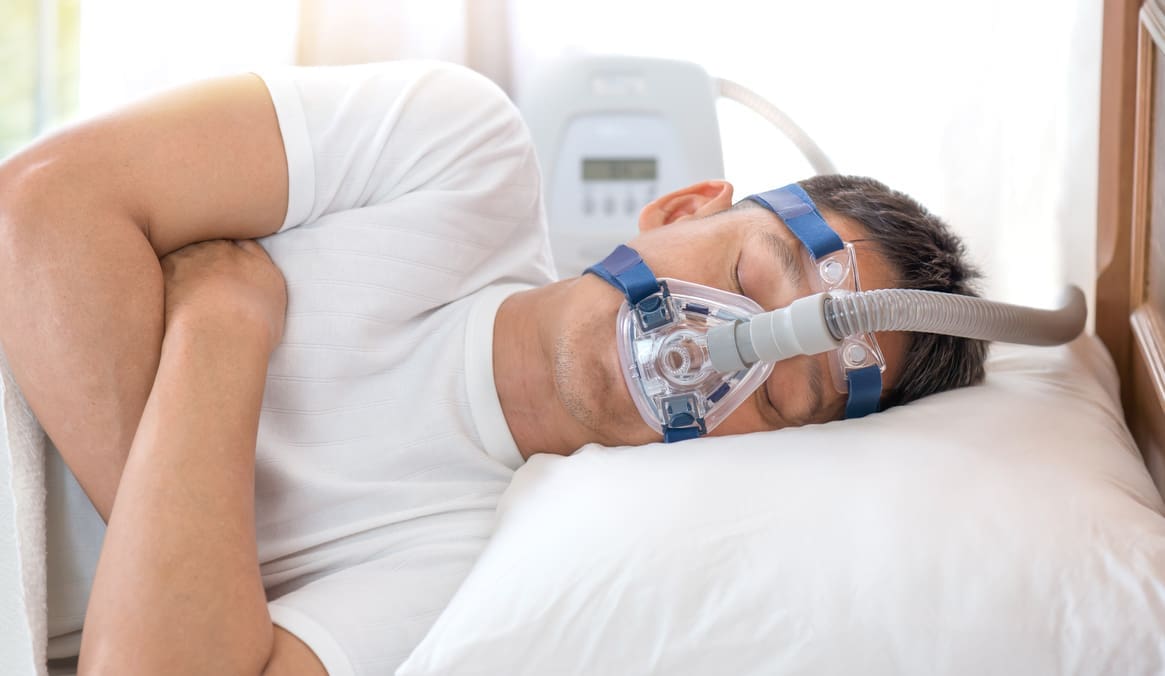Are Obstructive Sleep Apnea and Depression Connected?
Is there a relationship between depression and obstructive sleep apnea (OSA)? Although an exact pathophysiological relationship between OSA and depression is not fully understood, it seems that people with OSA are more likely to also experience depression.
What Is Obstructive Sleep Apnea?
Obstructive sleep apnea (OSA) is a condition that prevents you from breathing normally when you are asleep. OSA is caused by the muscles in your throat periodically closing during sleep. This might cause your breathing to become very shallow, or for your breathing to stop for short periods of time. These changes in your breathing could wake you up or be noticeable to someone in the same room. However, many people with obstructive sleep apnea don’t notice their breathing cessations.
There are several types of sleep apnea, but obstructive sleep apnea is the most common, with over 18 million cases in just the U.S. Some experts estimate that the actual number of cases in the U.S. is much higher, closer to 22 million individuals, as OSA frequently goes either undetected or gets misdiagnosed. The definitive diagnostic tool for determining the presence of sleep apnea is a sleep study.
People with obstructive sleep apnea may experience the following symptoms:
- Difficulty concentrating and/or remembering
- Extreme fatigue
- Loud snoring
- Jolting awake and feeling short of breath
- Sweating at night
- Headaches in the morning
- Extreme sadness
- Sexual dysfunction
- Waking up with a sore throat or dry mouth
- Irritability
- Grinding teeth at night
- Difficulty falling asleep and/or staying asleep
OSA can also lead to a number of more serious conditions, including chronic heart diseases, type 2 diabetes, gastroesophageal reflux disease, and high blood pressure.
Obstructive Sleep Apnea Risk Factors
Anyone can have obstructive sleep apnea. It’s more likely if you:
- Are male
- Are older
- Are black, Hispanic, or Native American
- Have a family history of sleep apnea
- Have asthma
- Smoke
- Have diabetes
- Have high blood pressure
- Are overweight or obese
- Have a large or thick neck
- Have smaller airways in your nose, throat, or mouth
- Have too much tissue at the back of your throat that hangs down to block your airway
What Is the Relationship Between Depression and Obstructive Sleep Apnea?
Obstructive sleep apnea symptoms has many symptoms in common with depression, such as fatigue, extreme sadness, poor concentration, sexual dysfunction, and insomnia. Before diagnosing a patient with depression, doctors should rule out first that OSA is not the cause of a patient’s depressive symptoms.
While some patients with OSA might be misdiagnosed with depression, others might be experiencing both conditions. Depression carries with it an approximately 18% prevalence of associated OSA; OSA has approximately 17% prevalence of depression. In fact, some studies have shown that 46% of people with OSA have prominent depressive symptoms. In other words, people with OSA experience depression at a much higher rate than most people.
The mechanism of the relationship between obstructive sleep apnea and depression is complex and remains unclear. Many studies are inconclusive, in part because the studies conducted so far often use very different tools. More research needs to be conducted to determine the exact relationship between obstructive sleep apnea and depression.
Do I Have Depression, Obstructive Sleep Apnea, or Both?
Given how many symptoms overlap between depression and obstructive sleep apnea, as well as the uncertainty over the exact relationship between these two conditions, how can you tell which one you have? Should you seek out treatment for OSA, depression, or both?
If you have been diagnosed with depression but have not responded to traditional methods such as antidepressants, talk to your physician about testing for OSA, especially if you have loud snoring and excessive daytime sleepiness. It’s possible that your depressive symptoms caused by OSA have led you to be incorrectly diagnosed with depression. If this turns out to be the case, your OSA as well as your depressive symptoms will likely be greatly improved by treatment. The most common and effective treatment for OSA is continuous positive airway pressure (CPAP) therapy, which splints the pharyngeal airway space leading to improved oxygenation and decreased sleep fragmentation
If you’ve been diagnosed with depression but haven’t found relief from your symptoms, it’s also quite possible that you have both obstructive sleep apnea and depression. If this describes you, you will likely need different treatment plans to alleviate the symptoms of both conditions. Studies have demonstrated that antidepressants are less effective in treating depression when there is also OSA present.
- Symptoms of obstructive sleep apnea (OSA) and depression overlap and may, therefore, complicate diagnosis and treatment of each disorder.
- Clinicians should evaluate patients with OSA for depression initially using screening tools, and if positive established criteria should be used to confirm the diagnosis.
- Effective treatment of both OSA and depression should be considered to improve overall quality of life.
Mid City TMS Can Help People with Obstructive Sleep Apnea and Depression
Some people on antidepressants do not respond well because they actually have obstructive sleep apnea rather than depression. Others might not see any relief from antidepressants because they are experiencing undiagnosed OSA in addition to their depression.
Regardless of whether you have depression, or obstructive sleep apnea in addition to depression, antidepressants are not helpful for many individuals.
If you have depression and antidepressants haven’t worked for you, you may be an excellent candidate for TMS. TMS is one of the most effective methods for treating depression, including for people with treatment-resistant depression that cannot be relieved by traditional methods.
Whether you struggle with depression or obstructive sleep apnea in addition to depression, you may have difficulty falling or staying asleep. Insomnia and other sleeping difficulties are a common symptom of both depression and OSA. Fortunately, studies have shown that TMS can actually make a noticeable difference in your quality of sleep.
TMS is a noninvasive procedure that can greatly help individuals with depression as well as depression and obstructive sleep apnea. Contact us today to learn more about how TMS can help you not only find relief from your depression and improve your sleep.



